University Healthcare Assignment: Primary Healthcare in Australia
VerifiedAdded on 2023/05/29
|7
|1632
|124
Report
AI Summary
This assignment analyzes key strategies in Australian Primary Health Care, focusing on the social determinants of health, equity, and social justice, and their impact on health outcomes. It examines the influence of epidemiological factors and the application of the WHO's five key principles of Primary Health Care. The report highlights the importance of addressing these determinants to improve the quality of life and longevity of individuals, particularly those affected by chronic disorders. The author emphasizes the role of primary healthcare professionals in advocating for improved education, employment opportunities, and health literacy to ensure equitable access to healthcare resources. The analysis underscores the bioethical principle of justice and the significance of community participation in shaping health agendas. The report concludes that a comprehensive, holistic approach to patient care, which includes addressing social determinants, is essential for effective healthcare outcomes and improved quality of life. This assignment is a great resource for students looking to understand the complexities of healthcare strategies and their implications for nursing practice.
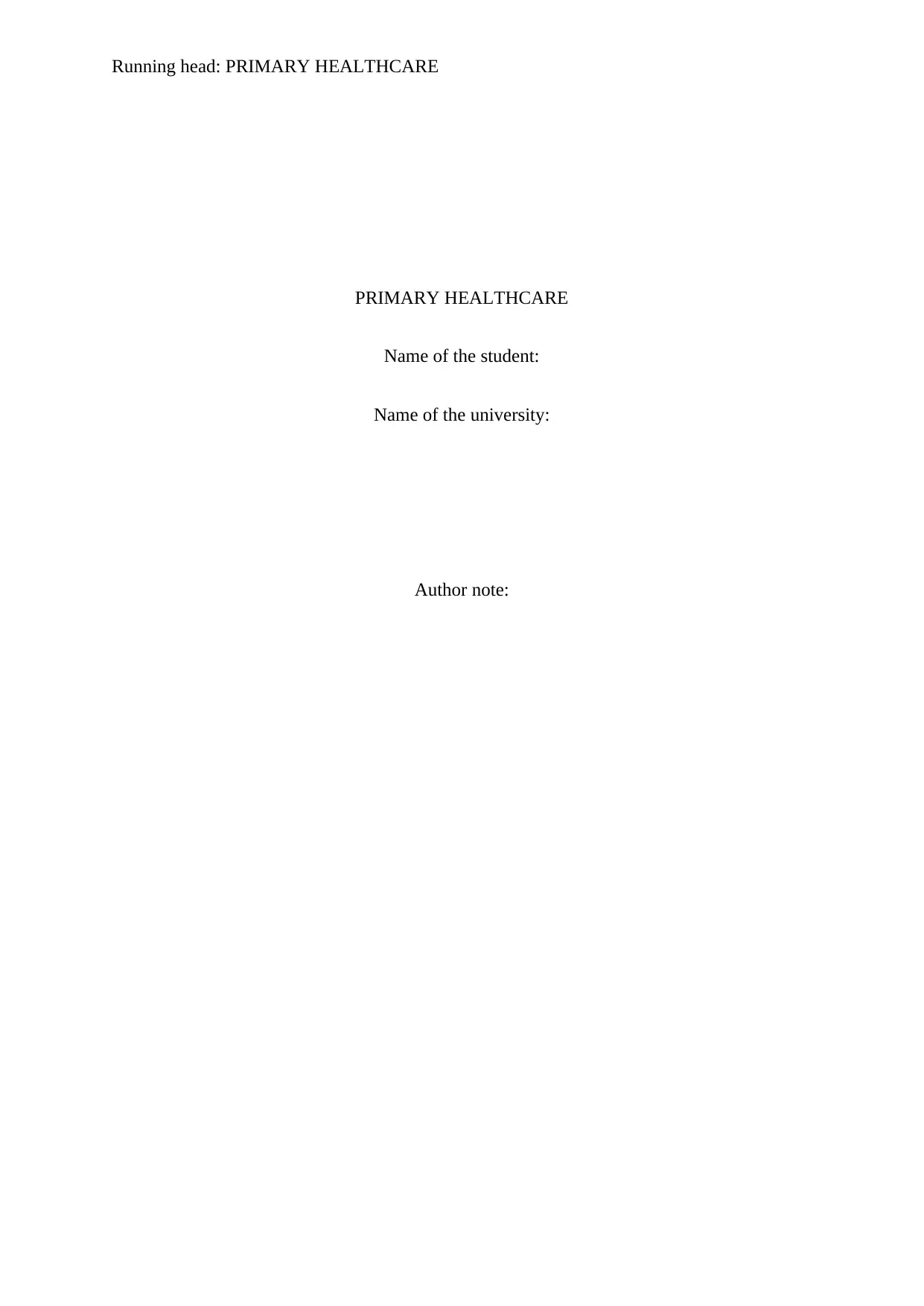
Running head: PRIMARY HEALTHCARE
PRIMARY HEALTHCARE
Name of the student:
Name of the university:
Author note:
PRIMARY HEALTHCARE
Name of the student:
Name of the university:
Author note:
Paraphrase This Document
Need a fresh take? Get an instant paraphrase of this document with our AI Paraphraser
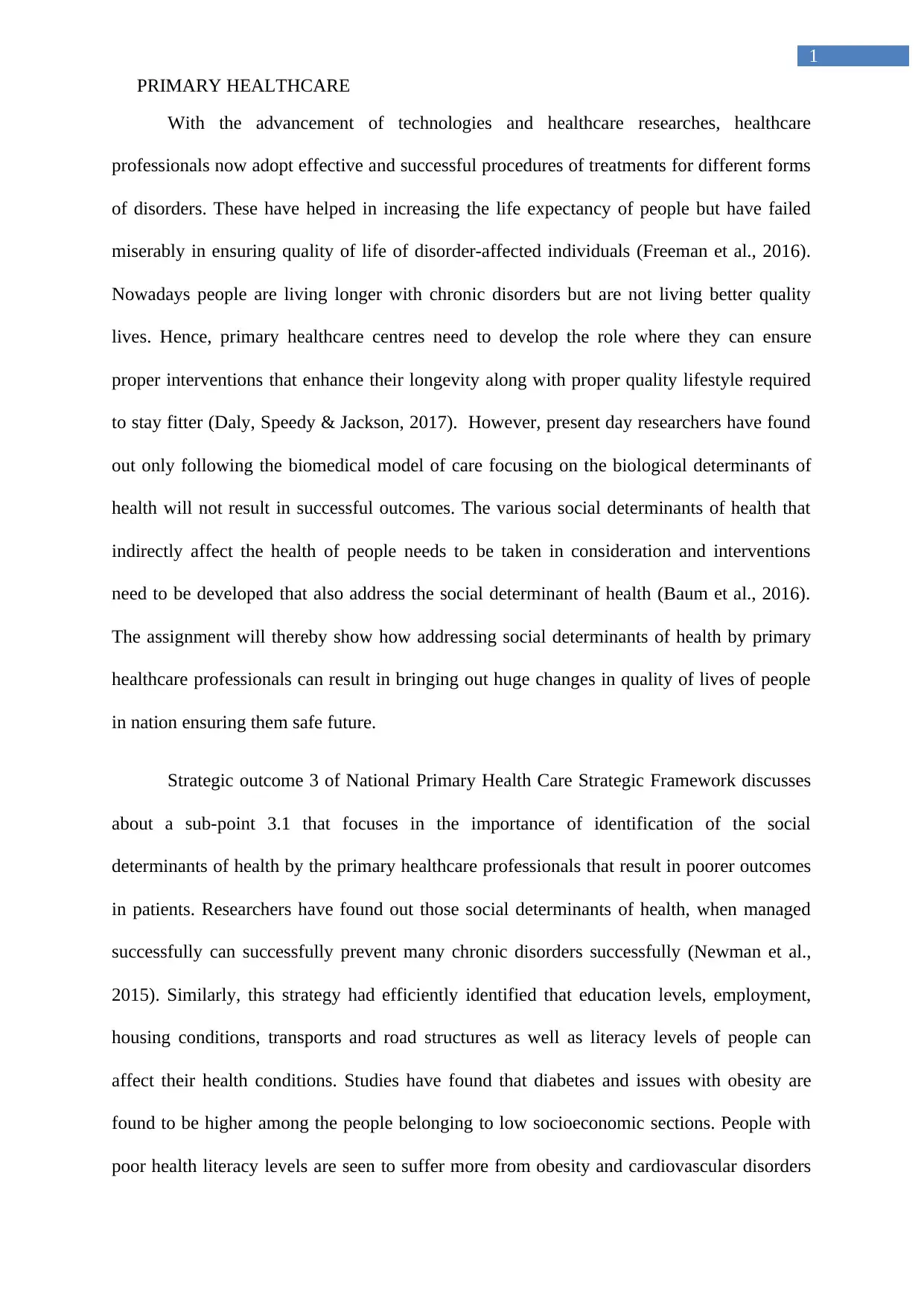
1
PRIMARY HEALTHCARE
With the advancement of technologies and healthcare researches, healthcare
professionals now adopt effective and successful procedures of treatments for different forms
of disorders. These have helped in increasing the life expectancy of people but have failed
miserably in ensuring quality of life of disorder-affected individuals (Freeman et al., 2016).
Nowadays people are living longer with chronic disorders but are not living better quality
lives. Hence, primary healthcare centres need to develop the role where they can ensure
proper interventions that enhance their longevity along with proper quality lifestyle required
to stay fitter (Daly, Speedy & Jackson, 2017). However, present day researchers have found
out only following the biomedical model of care focusing on the biological determinants of
health will not result in successful outcomes. The various social determinants of health that
indirectly affect the health of people needs to be taken in consideration and interventions
need to be developed that also address the social determinant of health (Baum et al., 2016).
The assignment will thereby show how addressing social determinants of health by primary
healthcare professionals can result in bringing out huge changes in quality of lives of people
in nation ensuring them safe future.
Strategic outcome 3 of National Primary Health Care Strategic Framework discusses
about a sub-point 3.1 that focuses in the importance of identification of the social
determinants of health by the primary healthcare professionals that result in poorer outcomes
in patients. Researchers have found out those social determinants of health, when managed
successfully can successfully prevent many chronic disorders successfully (Newman et al.,
2015). Similarly, this strategy had efficiently identified that education levels, employment,
housing conditions, transports and road structures as well as literacy levels of people can
affect their health conditions. Studies have found that diabetes and issues with obesity are
found to be higher among the people belonging to low socioeconomic sections. People with
poor health literacy levels are seen to suffer more from obesity and cardiovascular disorders
PRIMARY HEALTHCARE
With the advancement of technologies and healthcare researches, healthcare
professionals now adopt effective and successful procedures of treatments for different forms
of disorders. These have helped in increasing the life expectancy of people but have failed
miserably in ensuring quality of life of disorder-affected individuals (Freeman et al., 2016).
Nowadays people are living longer with chronic disorders but are not living better quality
lives. Hence, primary healthcare centres need to develop the role where they can ensure
proper interventions that enhance their longevity along with proper quality lifestyle required
to stay fitter (Daly, Speedy & Jackson, 2017). However, present day researchers have found
out only following the biomedical model of care focusing on the biological determinants of
health will not result in successful outcomes. The various social determinants of health that
indirectly affect the health of people needs to be taken in consideration and interventions
need to be developed that also address the social determinant of health (Baum et al., 2016).
The assignment will thereby show how addressing social determinants of health by primary
healthcare professionals can result in bringing out huge changes in quality of lives of people
in nation ensuring them safe future.
Strategic outcome 3 of National Primary Health Care Strategic Framework discusses
about a sub-point 3.1 that focuses in the importance of identification of the social
determinants of health by the primary healthcare professionals that result in poorer outcomes
in patients. Researchers have found out those social determinants of health, when managed
successfully can successfully prevent many chronic disorders successfully (Newman et al.,
2015). Similarly, this strategy had efficiently identified that education levels, employment,
housing conditions, transports and road structures as well as literacy levels of people can
affect their health conditions. Studies have found that diabetes and issues with obesity are
found to be higher among the people belonging to low socioeconomic sections. People with
poor health literacy levels are seen to suffer more from obesity and cardiovascular disorders
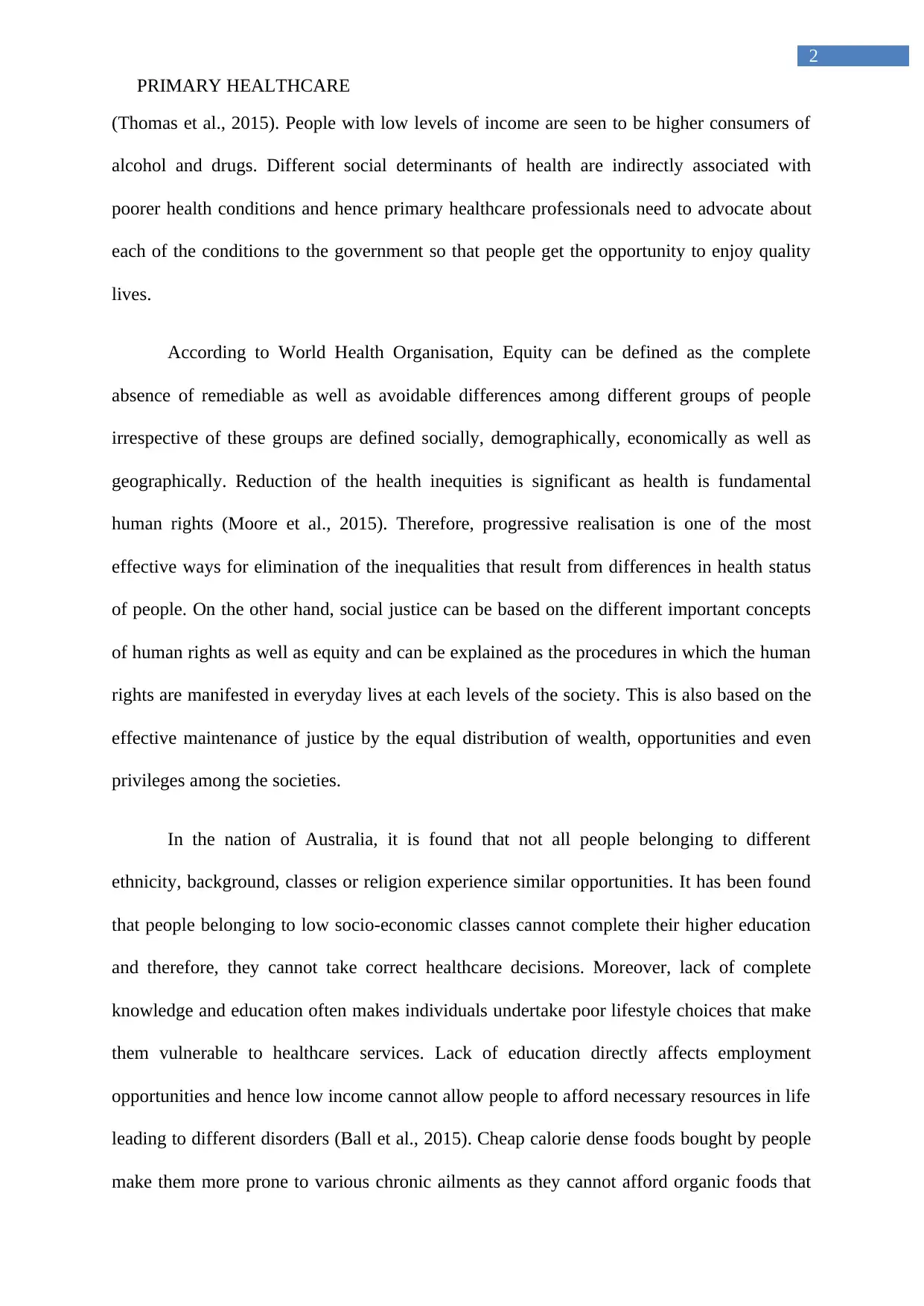
2
PRIMARY HEALTHCARE
(Thomas et al., 2015). People with low levels of income are seen to be higher consumers of
alcohol and drugs. Different social determinants of health are indirectly associated with
poorer health conditions and hence primary healthcare professionals need to advocate about
each of the conditions to the government so that people get the opportunity to enjoy quality
lives.
According to World Health Organisation, Equity can be defined as the complete
absence of remediable as well as avoidable differences among different groups of people
irrespective of these groups are defined socially, demographically, economically as well as
geographically. Reduction of the health inequities is significant as health is fundamental
human rights (Moore et al., 2015). Therefore, progressive realisation is one of the most
effective ways for elimination of the inequalities that result from differences in health status
of people. On the other hand, social justice can be based on the different important concepts
of human rights as well as equity and can be explained as the procedures in which the human
rights are manifested in everyday lives at each levels of the society. This is also based on the
effective maintenance of justice by the equal distribution of wealth, opportunities and even
privileges among the societies.
In the nation of Australia, it is found that not all people belonging to different
ethnicity, background, classes or religion experience similar opportunities. It has been found
that people belonging to low socio-economic classes cannot complete their higher education
and therefore, they cannot take correct healthcare decisions. Moreover, lack of complete
knowledge and education often makes individuals undertake poor lifestyle choices that make
them vulnerable to healthcare services. Lack of education directly affects employment
opportunities and hence low income cannot allow people to afford necessary resources in life
leading to different disorders (Ball et al., 2015). Cheap calorie dense foods bought by people
make them more prone to various chronic ailments as they cannot afford organic foods that
PRIMARY HEALTHCARE
(Thomas et al., 2015). People with low levels of income are seen to be higher consumers of
alcohol and drugs. Different social determinants of health are indirectly associated with
poorer health conditions and hence primary healthcare professionals need to advocate about
each of the conditions to the government so that people get the opportunity to enjoy quality
lives.
According to World Health Organisation, Equity can be defined as the complete
absence of remediable as well as avoidable differences among different groups of people
irrespective of these groups are defined socially, demographically, economically as well as
geographically. Reduction of the health inequities is significant as health is fundamental
human rights (Moore et al., 2015). Therefore, progressive realisation is one of the most
effective ways for elimination of the inequalities that result from differences in health status
of people. On the other hand, social justice can be based on the different important concepts
of human rights as well as equity and can be explained as the procedures in which the human
rights are manifested in everyday lives at each levels of the society. This is also based on the
effective maintenance of justice by the equal distribution of wealth, opportunities and even
privileges among the societies.
In the nation of Australia, it is found that not all people belonging to different
ethnicity, background, classes or religion experience similar opportunities. It has been found
that people belonging to low socio-economic classes cannot complete their higher education
and therefore, they cannot take correct healthcare decisions. Moreover, lack of complete
knowledge and education often makes individuals undertake poor lifestyle choices that make
them vulnerable to healthcare services. Lack of education directly affects employment
opportunities and hence low income cannot allow people to afford necessary resources in life
leading to different disorders (Ball et al., 2015). Cheap calorie dense foods bought by people
make them more prone to various chronic ailments as they cannot afford organic foods that
⊘ This is a preview!⊘
Do you want full access?
Subscribe today to unlock all pages.

Trusted by 1+ million students worldwide
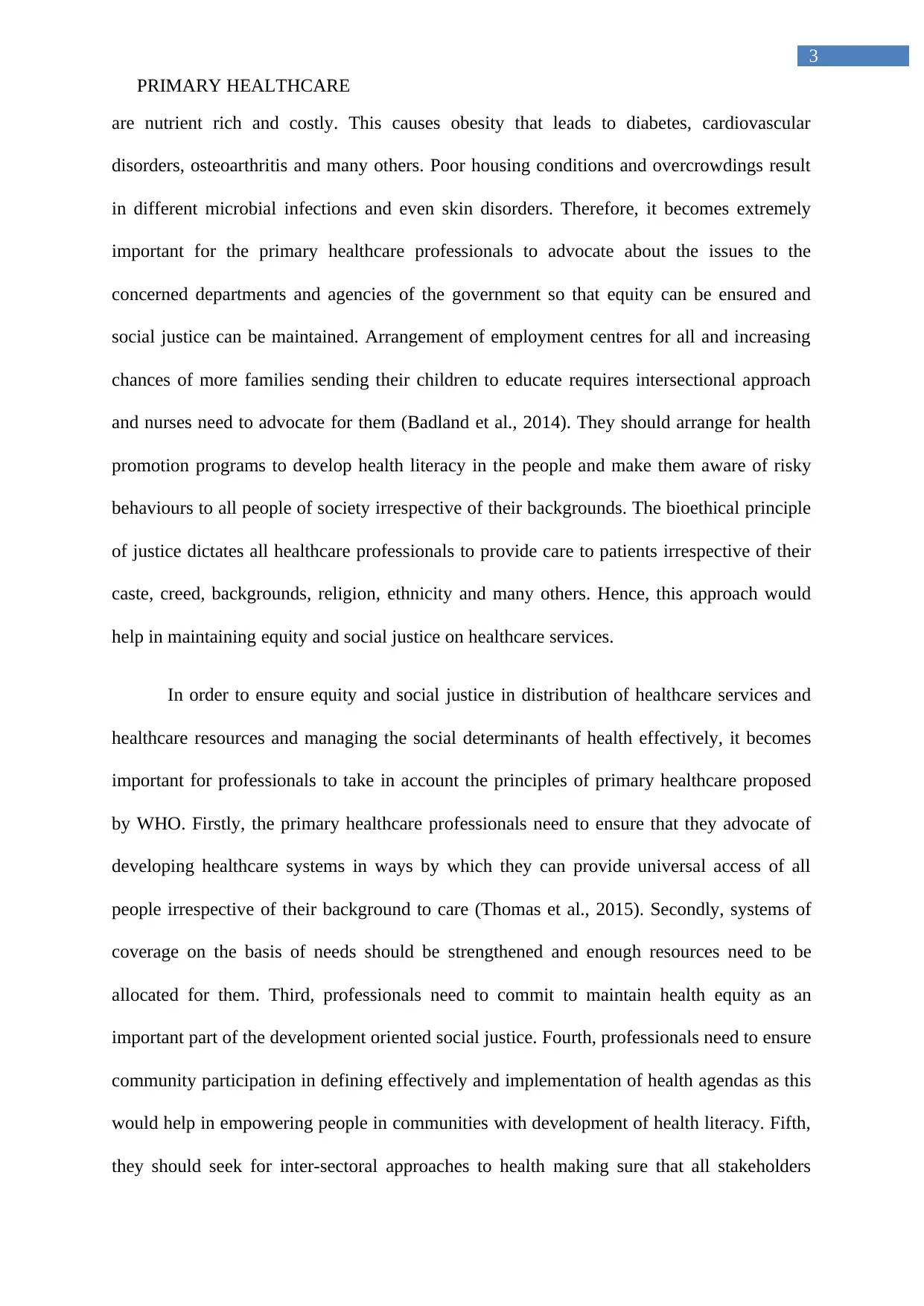
3
PRIMARY HEALTHCARE
are nutrient rich and costly. This causes obesity that leads to diabetes, cardiovascular
disorders, osteoarthritis and many others. Poor housing conditions and overcrowdings result
in different microbial infections and even skin disorders. Therefore, it becomes extremely
important for the primary healthcare professionals to advocate about the issues to the
concerned departments and agencies of the government so that equity can be ensured and
social justice can be maintained. Arrangement of employment centres for all and increasing
chances of more families sending their children to educate requires intersectional approach
and nurses need to advocate for them (Badland et al., 2014). They should arrange for health
promotion programs to develop health literacy in the people and make them aware of risky
behaviours to all people of society irrespective of their backgrounds. The bioethical principle
of justice dictates all healthcare professionals to provide care to patients irrespective of their
caste, creed, backgrounds, religion, ethnicity and many others. Hence, this approach would
help in maintaining equity and social justice on healthcare services.
In order to ensure equity and social justice in distribution of healthcare services and
healthcare resources and managing the social determinants of health effectively, it becomes
important for professionals to take in account the principles of primary healthcare proposed
by WHO. Firstly, the primary healthcare professionals need to ensure that they advocate of
developing healthcare systems in ways by which they can provide universal access of all
people irrespective of their background to care (Thomas et al., 2015). Secondly, systems of
coverage on the basis of needs should be strengthened and enough resources need to be
allocated for them. Third, professionals need to commit to maintain health equity as an
important part of the development oriented social justice. Fourth, professionals need to ensure
community participation in defining effectively and implementation of health agendas as this
would help in empowering people in communities with development of health literacy. Fifth,
they should seek for inter-sectoral approaches to health making sure that all stakeholders
PRIMARY HEALTHCARE
are nutrient rich and costly. This causes obesity that leads to diabetes, cardiovascular
disorders, osteoarthritis and many others. Poor housing conditions and overcrowdings result
in different microbial infections and even skin disorders. Therefore, it becomes extremely
important for the primary healthcare professionals to advocate about the issues to the
concerned departments and agencies of the government so that equity can be ensured and
social justice can be maintained. Arrangement of employment centres for all and increasing
chances of more families sending their children to educate requires intersectional approach
and nurses need to advocate for them (Badland et al., 2014). They should arrange for health
promotion programs to develop health literacy in the people and make them aware of risky
behaviours to all people of society irrespective of their backgrounds. The bioethical principle
of justice dictates all healthcare professionals to provide care to patients irrespective of their
caste, creed, backgrounds, religion, ethnicity and many others. Hence, this approach would
help in maintaining equity and social justice on healthcare services.
In order to ensure equity and social justice in distribution of healthcare services and
healthcare resources and managing the social determinants of health effectively, it becomes
important for professionals to take in account the principles of primary healthcare proposed
by WHO. Firstly, the primary healthcare professionals need to ensure that they advocate of
developing healthcare systems in ways by which they can provide universal access of all
people irrespective of their background to care (Thomas et al., 2015). Secondly, systems of
coverage on the basis of needs should be strengthened and enough resources need to be
allocated for them. Third, professionals need to commit to maintain health equity as an
important part of the development oriented social justice. Fourth, professionals need to ensure
community participation in defining effectively and implementation of health agendas as this
would help in empowering people in communities with development of health literacy. Fifth,
they should seek for inter-sectoral approaches to health making sure that all stakeholders
Paraphrase This Document
Need a fresh take? Get an instant paraphrase of this document with our AI Paraphraser
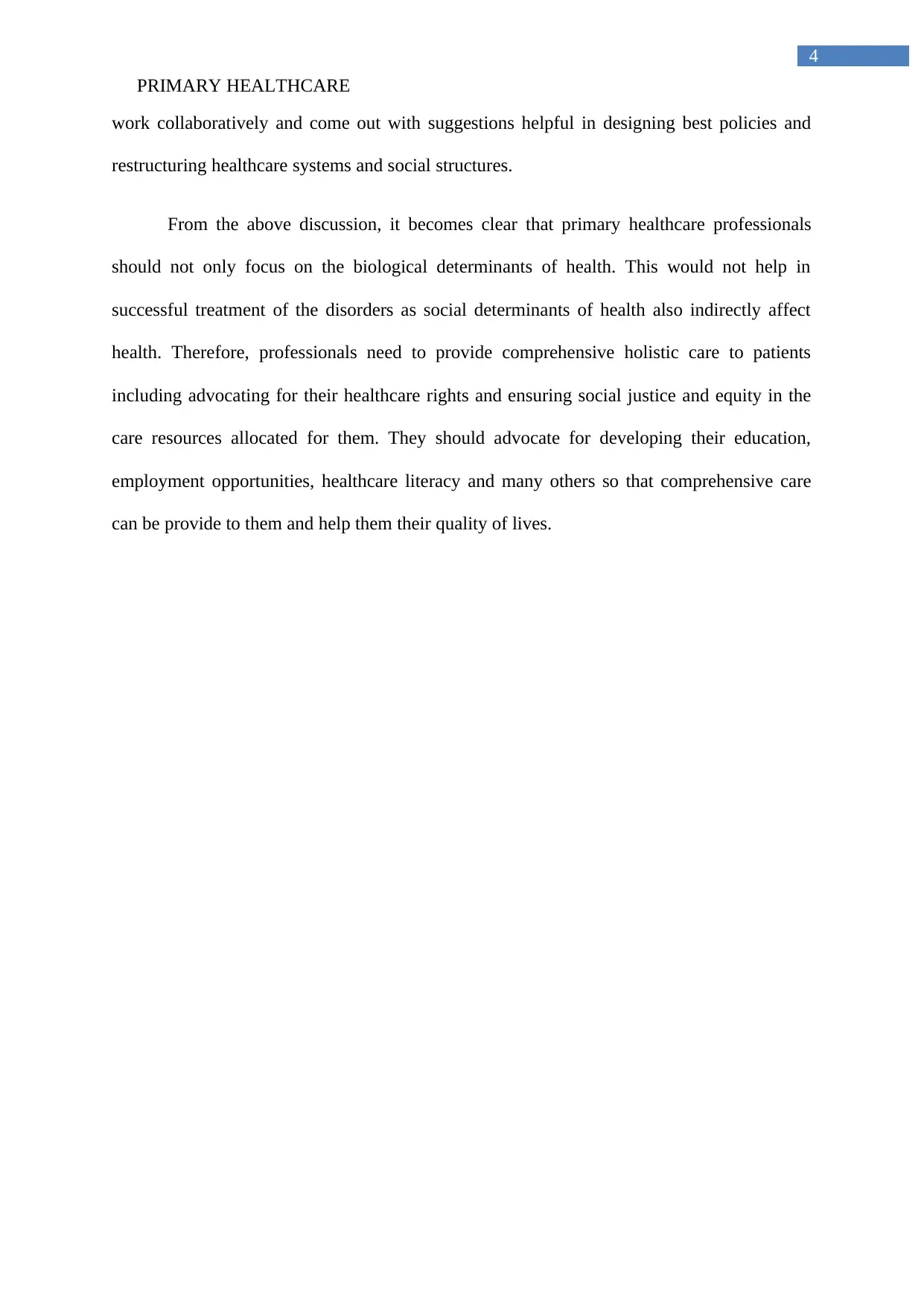
4
PRIMARY HEALTHCARE
work collaboratively and come out with suggestions helpful in designing best policies and
restructuring healthcare systems and social structures.
From the above discussion, it becomes clear that primary healthcare professionals
should not only focus on the biological determinants of health. This would not help in
successful treatment of the disorders as social determinants of health also indirectly affect
health. Therefore, professionals need to provide comprehensive holistic care to patients
including advocating for their healthcare rights and ensuring social justice and equity in the
care resources allocated for them. They should advocate for developing their education,
employment opportunities, healthcare literacy and many others so that comprehensive care
can be provide to them and help them their quality of lives.
PRIMARY HEALTHCARE
work collaboratively and come out with suggestions helpful in designing best policies and
restructuring healthcare systems and social structures.
From the above discussion, it becomes clear that primary healthcare professionals
should not only focus on the biological determinants of health. This would not help in
successful treatment of the disorders as social determinants of health also indirectly affect
health. Therefore, professionals need to provide comprehensive holistic care to patients
including advocating for their healthcare rights and ensuring social justice and equity in the
care resources allocated for them. They should advocate for developing their education,
employment opportunities, healthcare literacy and many others so that comprehensive care
can be provide to them and help them their quality of lives.
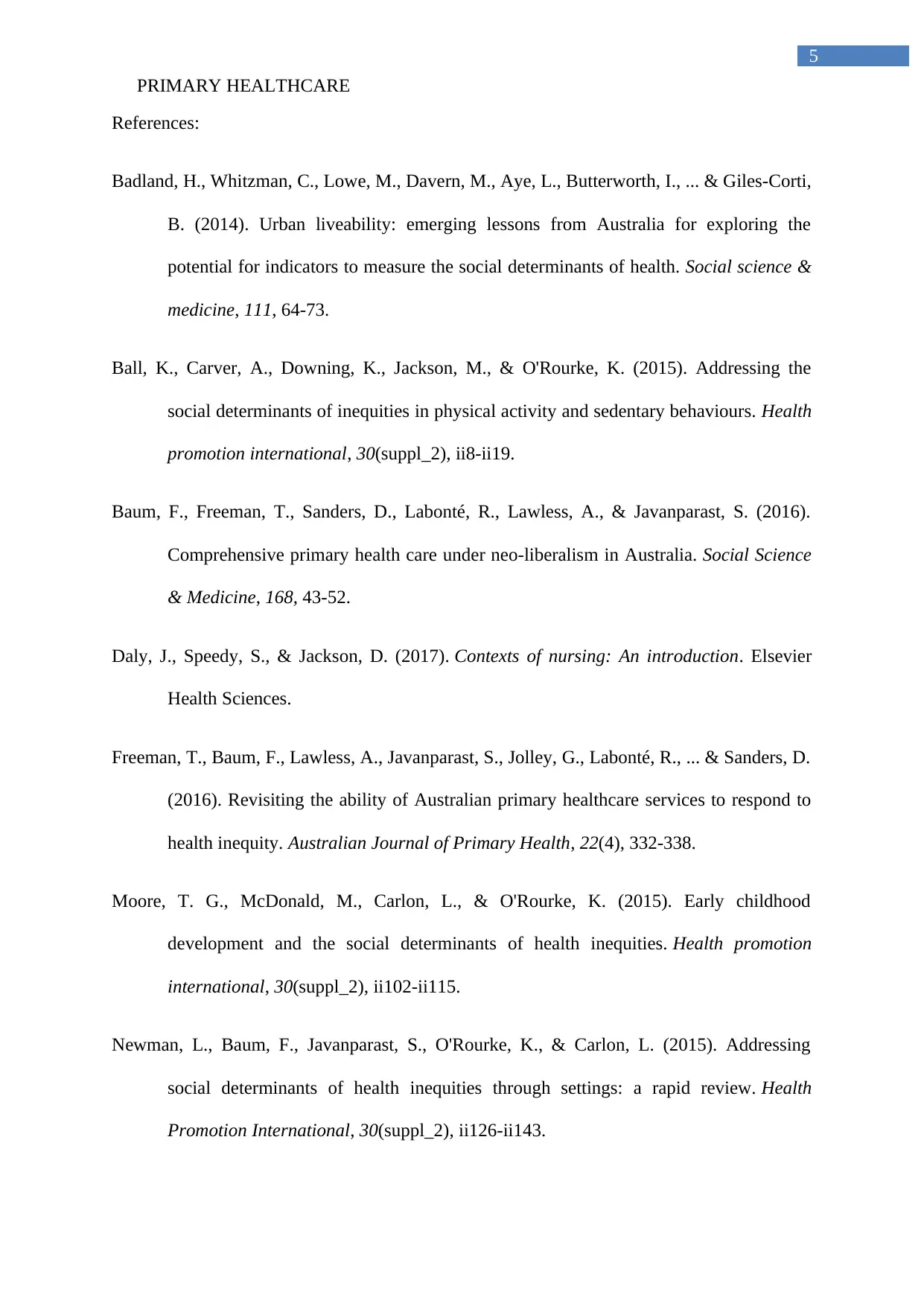
5
PRIMARY HEALTHCARE
References:
Badland, H., Whitzman, C., Lowe, M., Davern, M., Aye, L., Butterworth, I., ... & Giles-Corti,
B. (2014). Urban liveability: emerging lessons from Australia for exploring the
potential for indicators to measure the social determinants of health. Social science &
medicine, 111, 64-73.
Ball, K., Carver, A., Downing, K., Jackson, M., & O'Rourke, K. (2015). Addressing the
social determinants of inequities in physical activity and sedentary behaviours. Health
promotion international, 30(suppl_2), ii8-ii19.
Baum, F., Freeman, T., Sanders, D., Labonté, R., Lawless, A., & Javanparast, S. (2016).
Comprehensive primary health care under neo-liberalism in Australia. Social Science
& Medicine, 168, 43-52.
Daly, J., Speedy, S., & Jackson, D. (2017). Contexts of nursing: An introduction. Elsevier
Health Sciences.
Freeman, T., Baum, F., Lawless, A., Javanparast, S., Jolley, G., Labonté, R., ... & Sanders, D.
(2016). Revisiting the ability of Australian primary healthcare services to respond to
health inequity. Australian Journal of Primary Health, 22(4), 332-338.
Moore, T. G., McDonald, M., Carlon, L., & O'Rourke, K. (2015). Early childhood
development and the social determinants of health inequities. Health promotion
international, 30(suppl_2), ii102-ii115.
Newman, L., Baum, F., Javanparast, S., O'Rourke, K., & Carlon, L. (2015). Addressing
social determinants of health inequities through settings: a rapid review. Health
Promotion International, 30(suppl_2), ii126-ii143.
PRIMARY HEALTHCARE
References:
Badland, H., Whitzman, C., Lowe, M., Davern, M., Aye, L., Butterworth, I., ... & Giles-Corti,
B. (2014). Urban liveability: emerging lessons from Australia for exploring the
potential for indicators to measure the social determinants of health. Social science &
medicine, 111, 64-73.
Ball, K., Carver, A., Downing, K., Jackson, M., & O'Rourke, K. (2015). Addressing the
social determinants of inequities in physical activity and sedentary behaviours. Health
promotion international, 30(suppl_2), ii8-ii19.
Baum, F., Freeman, T., Sanders, D., Labonté, R., Lawless, A., & Javanparast, S. (2016).
Comprehensive primary health care under neo-liberalism in Australia. Social Science
& Medicine, 168, 43-52.
Daly, J., Speedy, S., & Jackson, D. (2017). Contexts of nursing: An introduction. Elsevier
Health Sciences.
Freeman, T., Baum, F., Lawless, A., Javanparast, S., Jolley, G., Labonté, R., ... & Sanders, D.
(2016). Revisiting the ability of Australian primary healthcare services to respond to
health inequity. Australian Journal of Primary Health, 22(4), 332-338.
Moore, T. G., McDonald, M., Carlon, L., & O'Rourke, K. (2015). Early childhood
development and the social determinants of health inequities. Health promotion
international, 30(suppl_2), ii102-ii115.
Newman, L., Baum, F., Javanparast, S., O'Rourke, K., & Carlon, L. (2015). Addressing
social determinants of health inequities through settings: a rapid review. Health
Promotion International, 30(suppl_2), ii126-ii143.
⊘ This is a preview!⊘
Do you want full access?
Subscribe today to unlock all pages.

Trusted by 1+ million students worldwide
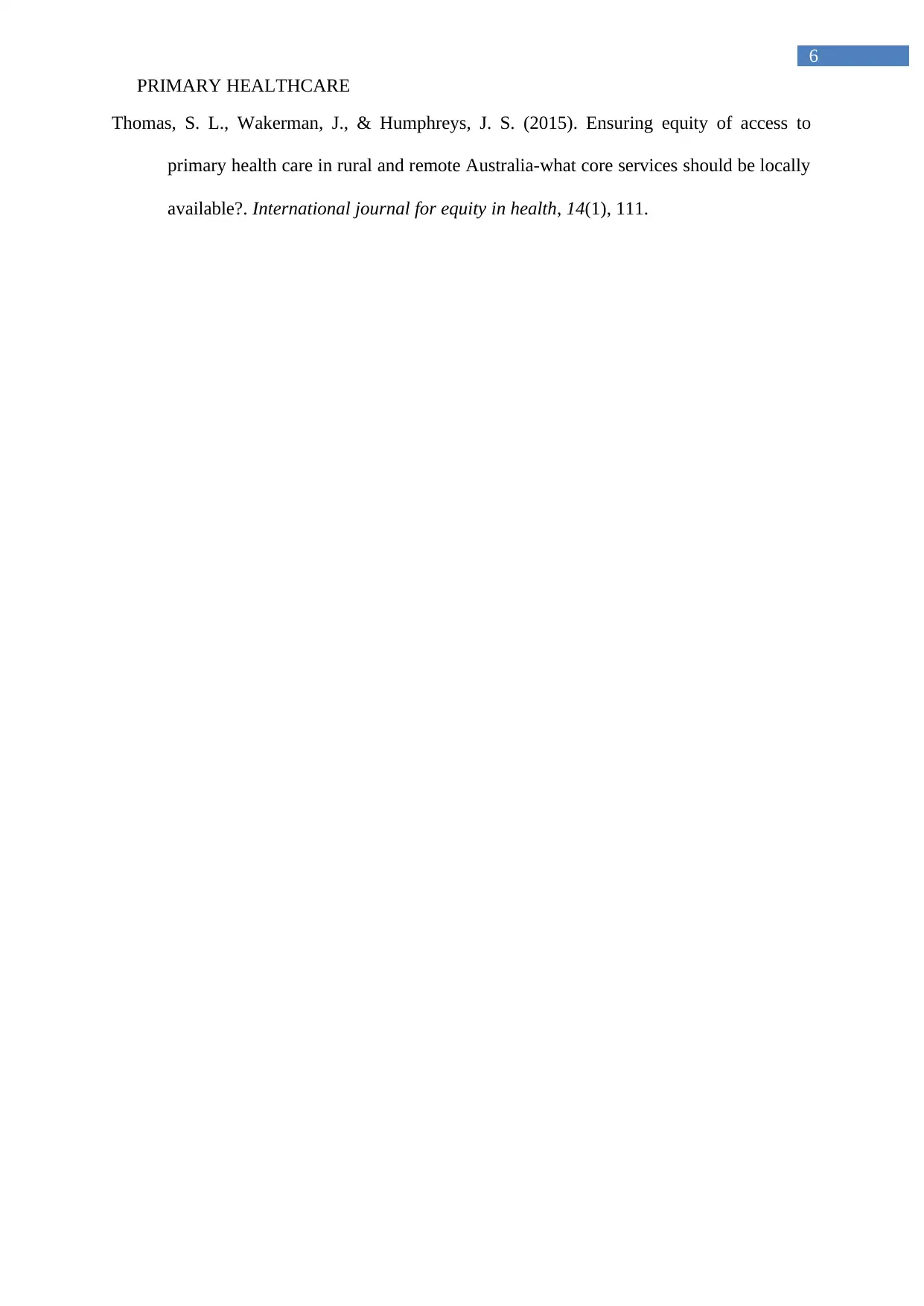
6
PRIMARY HEALTHCARE
Thomas, S. L., Wakerman, J., & Humphreys, J. S. (2015). Ensuring equity of access to
primary health care in rural and remote Australia-what core services should be locally
available?. International journal for equity in health, 14(1), 111.
PRIMARY HEALTHCARE
Thomas, S. L., Wakerman, J., & Humphreys, J. S. (2015). Ensuring equity of access to
primary health care in rural and remote Australia-what core services should be locally
available?. International journal for equity in health, 14(1), 111.
1 out of 7
Related Documents
Your All-in-One AI-Powered Toolkit for Academic Success.
+13062052269
info@desklib.com
Available 24*7 on WhatsApp / Email
![[object Object]](/_next/static/media/star-bottom.7253800d.svg)
Unlock your academic potential
Copyright © 2020–2026 A2Z Services. All Rights Reserved. Developed and managed by ZUCOL.




